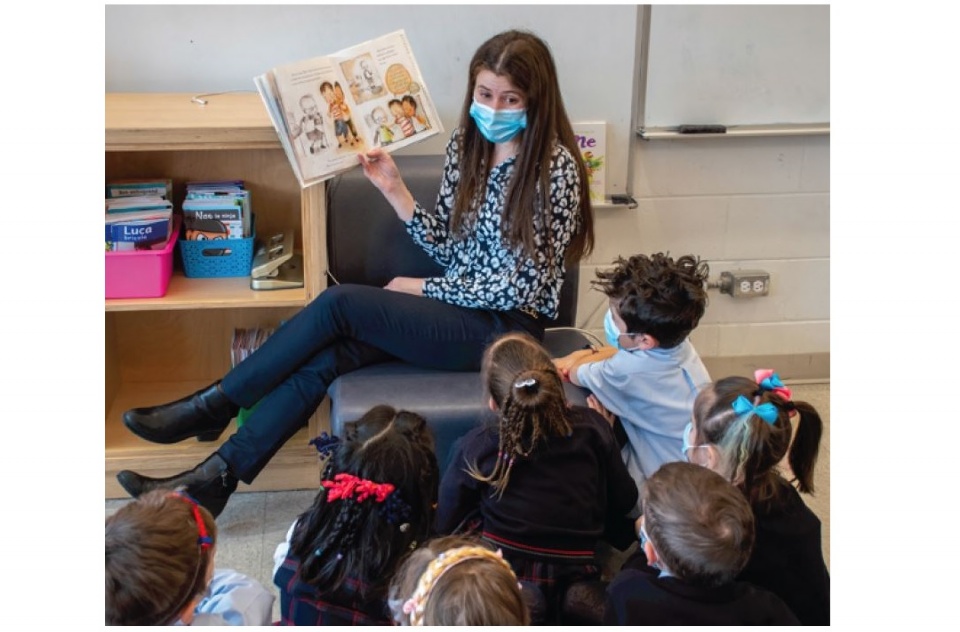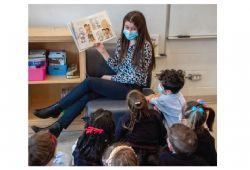When rafts of lively students spill out the doors of its charming buildings and spread across its verdant playing fields on Royal Avenue in Montreal, Lower Canada College meets the visual expectations an observer might have of one of Canada’s leading schools. Its reputation for academic success is testified to by more than a century of graduates who have reached every echelon of achievement. In addition to its rigorous academic curriculum, a combination of changing times and new perspectives in psychology is also bringing the importance of the emotional well-being of LCC’s students to the fore.
Children today face an array of stressors that were unknown to their parents: the omnipresence of the online world, sweeping social and cultural changes, COVID and its many disruptions. All have contributed to increases in anxiety and feelings of disconnection. Recognizing the risks that these new pressures entail, LCC has been thoughtfully putting supports in place, systems intended not to remove challenges from their students’ paths, but to help them build techniques and practice coping mechanisms so they can face and overcome the obstacles that life is sure to throw their way.Teachers and counsellors for the youngest grades have been emphasizing social-emotional learning (SEL) employing a well-regarded program called Zones of Regulation. It makes use of a simple colour-coded system to help students name and recognize their feelings in order to foster greater control of their emotions. Understanding their own feelings also helps them to normalize sometimes confusing or scary emotions and empathize with their classmates, which can reduce friction in class and lead to a better learning environment. In later Junior School grades, a new program called the Umbrella Project has been implemented, building on this emotional work and introducing skills like resilience, realistic optimism and growth mindset. When LCC adopted this leading-edge curriculum last fall, it was the first school in Quebec to do so.As students make their way through the Middle School years, LCC has adopted a framework outlined by world-renowned psychologist Martin Seligman: the PERMA-V model, which stands for Positive emotion, Engagement, Relationships, Meaning, Accomplishment, and Vitality. Intended to improve well-being and help people flourish, PERMA-V has had demonstrated success in education settings and beyond. LCC Outreach and Wellness Coordinator Gillian Shadley also notes the importance of adult mentorship. “Experience has taught us that when students build relationships, not only with each other but with at least one faculty member, it leads them to greater comfort and success.” To this end, a wide array of staff is on hand: teachers, of course, but also three full-time school counsellors, grade coordinators, directors, interns, nurses, and coaches, all working in cooperation. “The more adults you bring in, with a diversity of experiences and interests, the easier it is for kids to make a connection,” says Shadley.One of LCC’s great strengths is its advisory program, which begins in Middle School and continues throughout Senior School. Groups of 10-15 students meet twice weekly with a teacher who gets to know them and follows their growth over a period of several years. This advisor acts as an advocate and guide, offering advice and monitoring progress. These sessions are a great milieu in which to explore PERMA-V and some of the more complex elements of social well-being that students must deal with. As LCC Director of Student Life, Michele Owen says, “We’re using reframing and mindfulness techniques that offer alternatives to frustration and withdrawal. To a traditional refrain like ‘I just can’t do quadratic equations’ the students are learning to add ‘yet!’ And they’re also learning the value of breaking things down into manageable goals rather than lofty ones. It’s an approach deeply rooted in research, and it’s showing a real effect on both our students’ sense of self and their academic, co-curricular, and social success.”
 In The Latest Issue:Latest Issue:
In The Latest Issue:Latest Issue:
- A Bittersweet Farewell
- The new Laval Aquatic Co...
- The End of an Era:
Articles
Calendar
Virtual- ANNUAL TEACHER APPRECIATION CONTEST
- APPUI LAVAL
- ARTS & CULTURE
- CAMPS
- CAR GUIDE
- CCIL
- CENTENNIAL ACADEMY
- CHARITY FUNDRAISING
- CITYTV
- COSMODÔME
- COMMUNITY CONNECTIONS
- COVER STORY
- DINA DIMITRATOS
- ÉCOLE SUPÉRIEURE DE BALLET DU QUÉBEC
- EDITORIALS
- ÉDUCALOI
- EDUCATION
- EMPLOYMENT & ENTREPRENEURSHIP
- FÊTE DE LA FAMILLE
- FÊTE DU QUARTIER SAINT-BRUNO
- FAMILIES
- FESTIVAL LAVAL LAUGHS
- FÊTE DE QUARTIER VAL-DES-BRISES
- FINANCES
- GLI CUMBARE
- GROUPE RENO-EXPERT
- HEALTH & WELL-BEING
- 30 MINUTE HIT
- ANXIETY
- CHILDREN`S HEALTH & WELLNESS
- CLOSE AID
- DENTAL WELLNESS
- EXTREME EVOLUTION SPORTS CENTRE
- FONDATION CITÉ DE LA SANTÉ
- GENERAL
- HEARING HEALTH
- MESSAGES FROM THE HEALTH AGENCY OF CANADA
- MENTAL HEALTH
- SEXUALITY
- SOCIAL INTEGRATION
- SPECIAL NEEDS
- TEENS
- THE NUTRITION CORNER
- THE NUTRITION CORNER - RECIPES
- VACATION DESTINATION
- WOMEN'S FITNESS
- WOMEN'S HEALTH
- HILTON MONTREAL/LAVAL
- HOME & GARDEN
- INTERNATIONAL WOMEN'S DAY
- JAGUAR LAVAL
- LAVAL À VÉLO
- LAVAL FAMILIES TV SHOW
- LAVAL FAMILIES MAGAZINE CARES
- LAVAL URBAN IN NATURE
- LE PARCOURS DES HÉROS
- LES PETITS GOURMETS DANS MA COUR
- LEON'S FURNITURE
- LEONARDO DA VINCI CENTRE
- LFM PREMIERES
- LIFE BALANCE
- M.P. PROFILE
- MISS EDGAR'S AND MISS CRAMP'S SCHOOL
- MISSING CHILDREN'S NETWORK
- NETFOLIE
- NORTH STAR ACADEMY LAVAL
- OUTFRONT MEDIA
- PASSION SOCCER
- PARC DE LA RIVIÈRE-DES-MILLE-ÎLES
- PÂTISSERIE ST-MARTIN
- PIZZERIA LÌOLÀ
- PLACE BELL
- PORTRAITS OF YOUR MNA'S
- ROCKET DE LAVAL
- SACRED HEART SCHOOL
- SCOTIA BANK
- SHERATON LAVAL HOTEL
- SOCIÉTÉ ALZHEIMER LAVAL
- STATION 55
- STL
- SUBARU DE LAVAL
- TECHNOLOGY
- TEDXLAVAL
- TODAY`S LAURENTIANS AND LANAUDIÈRE
- TODAY`S LAVAL
- WARNER MUSIC
- THIS ISSUE
- MOST RECENT
Magazine
Articles ~e 105,7 Rythme FM 4 chemins Annual Teacher Appreciation Contest Appui Laval Arts & Culture Ballet Eddy Toussaint Camps THIS ISSUE MORE...
CONTESTS Enter our contests
CONTESTS Enter our contests
CALENDAR
Events & Activities
COMMUNITY Posts Events
PUBLICATIONS Our Magazine Family Resource Directory
LFM BUSINESS NETWORK Learn more
COUPONS Click to save!
COMMUNITY Posts Events
PUBLICATIONS Our Magazine Family Resource Directory
LFM BUSINESS NETWORK Learn more
COUPONS Click to save!
SUBSCRIPTIONS
Subscribe to the magazine
Un-Subscribe
E-NEWSLETTER Subscribe to our E-newsletter Un-Subscribe
WRITE FOR US Guidelines & Submissions
POLLS Vote today!
E-NEWSLETTER Subscribe to our E-newsletter Un-Subscribe
WRITE FOR US Guidelines & Submissions
POLLS Vote today!
ADVERTISERS
How to & Media guide
Pay your LFM invoice
SUGGESTIONS Reader's Survey Suggest a Listing
LFM About Us Our Mission Giving Back Contact Us
SUGGESTIONS Reader's Survey Suggest a Listing
LFM About Us Our Mission Giving Back Contact Us
 PICK-UP LOCATIONS
Get a copy of LFM!
PICK-UP LOCATIONS
Get a copy of LFM!
TERMS & CONDITIONS Privacy | Terms
ISSN (ONLINE) 2291-1677
ISSN (PRINT) 2291-1677
Website by ZENxDESIGN



 BY:
BY: 
Tweet
Share